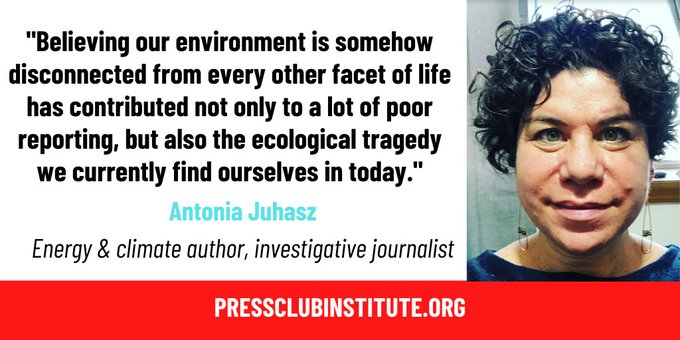Antonia provides tips on environmental and climate reporting.


“Whatever your beat, the environment and climate…are already a part of it,” says oil & energy journalist.
By Holly Butcher Grant
Learning Manager, hgrant@press.org
The Biden-Harris administration has signaled a dramatic shift on climate policy.
In the wake of “Climate Day” — the flurry of environmental executive orders signed on Jan. 27 — we asked energy and climate author Antonia Juhasz how journalists can prepare to cover the climate crisis.
“Reporting on the Biden administration’s executive orders and other actions is critical,” she said in an email. “Don’t let the lack of Trump extremism lead you to believe policy stories aren’t critical and interesting to readers.”
Juhasz is the author of three books on the oil industry; a journalist with bylines in Rolling Stone, Newsweek, Harper’s Magazine, Ms. Magazine, The New York Times, The Los Angeles Times, The Nation and The Atlantic; and a Bertha Fellow in Investigative Journalism.
What are your top three tips for reporting on the environment and climate change when it’s not normally your beat?
Juhasz: Whatever your beat, the environment and climate – which are fundamentally interconnected – are already a part of it. Do not think of “the environment” in isolation. Believing our environment is somehow disconnected from every other facet of life has contributed not only to a lot of poor reporting, but also the ecological tragedy we currently find ourselves in today.
Every environment story should be viewed through a justice and equity lens. Without systemic racism, there would likely be no climate crisis, as the former permits fossil fuel and other polluting industries to be disproportionately located in communities and nations of color and indigenous communities. Women and people of color are disproportionately harmed. Unable to distance or offshore these harms, these operations would not be so proliferate or tolerated. Understand environmental justice andequity, including gender equity, as starting points for the problem (injustice, inequity), and the solution (achieving justice and equity), then go from there. As such, be sure to diversify your subjects. Always interviewing or quoting white men? Stop it.
Ask these basic questions: Who committed the environmental/climate crime, who is righting the wrong, who is most impacted – how and why, and who is offering solutions? Hold polluters accountable and name names! And never underestimate the power of a company’s 10K or 20F SEC filing, they are invaluable. Always tell your story through those people on the front lines most impacted by these harms. Treat them as the experts that they are. Reach out early and often. Finally, I’ve pretty much never seen an environmental harm that someone wasn’t working to rectify (usually that frontline person). Share that solutions story. It will give readers hope!
What do you see are the biggest climate change stories or trends right now?
Juhasz: The potential demise of the fossil fuel industry, including how communities and nations are working to keep fossil fuels in the ground. There’s no end to the ways to cover this story. Fossil fuels are the primary driver of the climate crisis. And well before the COVID-19 pandemic, the growth in demand for oil worldwide was falling. Social movements, indigenous communities, workers, policy makers, the finance sector, businesses and regular people everywhere are involved in and driving this transition. Investigate and report on them. These include the movements for Green Stimulus and Green New Deal and related policies locally, nationally and internationally. How more people are seeing the economic win from confronting the climate crisis and fossil fuels, rather than the old frame of a “tradeoff” between the two. Learn the phrases “managed decline” of and a “just and equitable transition” from fossil fuels.
Reporting on the Biden administration’s executive orders and other actions is critical. Don’t look at these in isolation – the administration doesn’t. See EOs and rule changes on environmental justice, equity, systemic racism, housing, the economy, building back from COVID, health care, policing, immigration, etc., as all a part of addressing the climate crisis. Report accordingly. Follow through: How will these be turned from policy into practice? Who on the ground is most impacted by these policies, what are they doing to see the policies implemented, who’s resisting and why? Don’t let the lack of Trump extremism lead you to believe policy stories aren’t critical and interesting to readers! The failure to cover not-extremist stories is a key reason why so many people don’t understand policy or care. Tell the day-to-day story of meaningful policy process, outcome, success or failure and the people involved. Report it well, and readers will care.
The end of false equivalences. The climate crisis is real, and it’s inherently bad and requires solutions. No need to sugarcoat these realities or raise the platform of those who argue otherwise.
What climate change stories are journalists missing out on?
Juhasz: The role of indigenous and frontline peoples as protectors of the climate. When indigenous peoples and other marginalized frontline communities are permitted to stay on their lands and continue their traditional roles as forest, water and land protectors, when their traditional knowledge is respected, their environments thrive, protecting the climate for everyone. How are these practices being threatened and protected and by whom? How does it play out in nations and local communities around the world?
The disentanglement of the finance from the fossil-fuel sectors is an absolute game changer. This is the result of years of organizing and the outcome of economic realities also achieved through years of organizing, policy making, activism, etc. Follow and cover this story, which will impact local, national and global politics, economics, business, and of course, climate change.
There’s a lessening distinction between what is domestic and what is international policy on climate and everything that follows from it. From those worried by (rather than welcoming of) climate migrants and increasing immigration, to more and worsening global pandemics, and conflicts over lessening resources due to droughts, fires, and floods, the climate crisis is poised to create even further destabilization that knows no boundaries. The line between what is domestic and what is international policy-making is going to be ever-more blurred because of it. Just as the “problems” are more internationalized, so too are the solutions and movements working to find them.
Can you share some resources for getting up to speed quickly on environmental issues and policy?
Juhasz: My best advice on resources? Don’t just use white men as your sources!
First: Those most directly impacted by the environment and climate should be understood as experts. Then, when reaching out to those with academic or other “formal” expertise, search for resources to expand your interview base beyond just who was interviewed by others. The tendency to identify interview subjects based on those who have been interviewed elsewhere perpetuates the same people being interviewed, which has traditionally been white men. A 2015 study found that women are quoted as experts in less than 20% of all global news stories.
A few resources to diversify your expert base:
- The Sadie Collective: Black women economists
- 500 Women Scientists
- Interview Her: International expert women on war and conflict
Other resources:
- Society of Environmental Journalists: SEJ’s 2021 Journalists’ Guide to Energy & Environment and tipsheet
- Inside Climate News
- Stockholm Environment Institute: bridging science and policy
- NAACP Environmental & Climate Justice
- Institute for Journalism & Natural Resources
How are you taking care of yourself during the pandemic?
Juhasz: I take a 45-minute walk outside every day, making sure to look up at the sun, sky and trees. I try to connect with colleagues and friends as much as possible outside on walks, via Zoom, etc. I read a lot of novels! And I try to take care of others.
